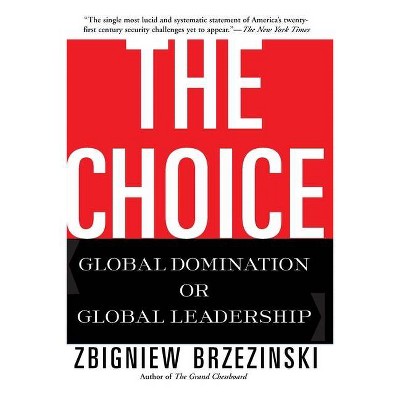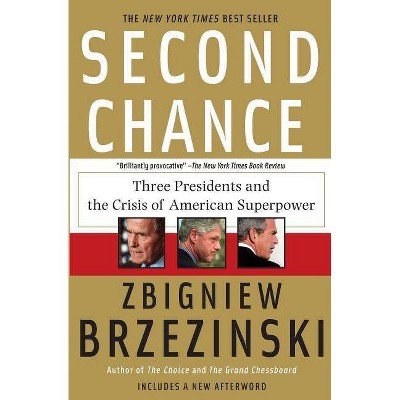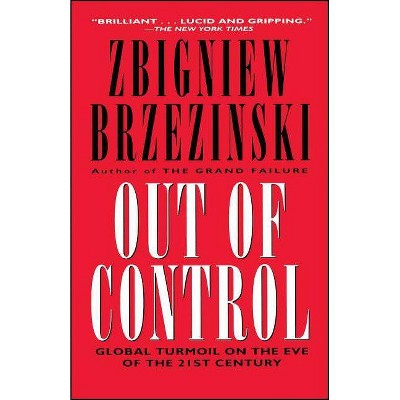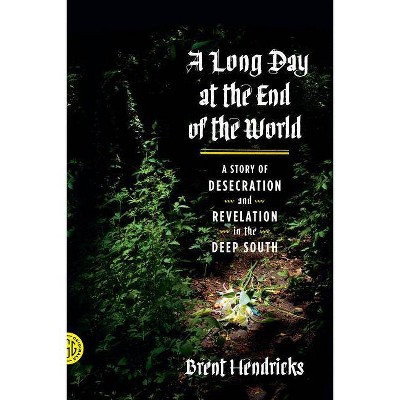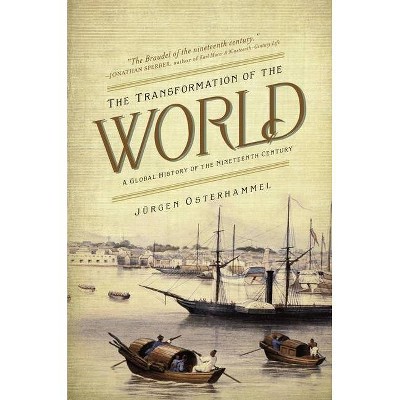America and the World - by Zbigniew Brzezinski & Brent Scowcroft (Paperback)
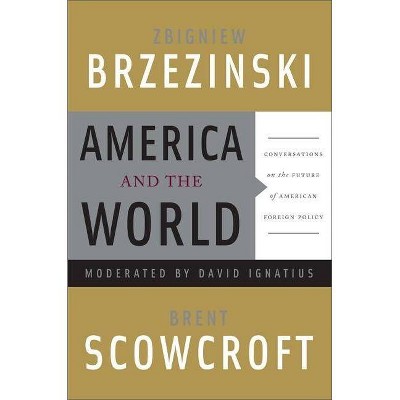
Similar Products
Products of same category from the store
AllProduct info
<p/><br></br><p><b> About the Book </b></p></br></br>Two of the most respected figures in American foreign policy define the international challenges facing the next president.<p/><br></br><p><b> Book Synopsis </b></p></br></br>The status of the United States as a world power, and the nature of power itself, are at a historic turning point. It is essential that we understand and adapt to the new security environment in which we find ourselves. <p/> Two of the most respected figures in American foreign policy are Zbigniew Brzezinski and Brent Scowcroft -- both former National Security Advisors under markedly different administrations. In <i>America and the World</i> they dissect, in spontaneous and unscripted conversations moderated by David Ignatius, the most significant foreign policy challenges facing the U.S.: the Middle East, Russia, China, Europe, the Developing World, the changing nature of power in a globalized world, and what Brzezinski has called the global political awakening. While one author is a Republican and the other a Democrat, they broadly agree on the need to adapt to a new international environment. Where they disagree, their exchanges are always both deeply informed and provocative. <p/><i>America and the World</i> will define the center of responsible opinion on American foreign policy at a time when the nation's decisions could determine how long it remains a superpower.<p/><br></br><p><b> Review Quotes </b></p></br></br><br>"Boston Globe"<BR>.,"had Sarah Palin read this handy primer before the election, she might have had more to talk about than the view of Russia. The rest of America should read it now to understand what lies before us."<br><br>"The American Conservative"<BR>"In the coming years, we can only hope that policymakers embrace the enlightened realism of Brzezinski and Scowcroft."<br><br>"Library Journal"<BR>"An accessible survey of important questions..."<br><br>From "The New York Times" <BR> Reviewed by Michiko Kakutani<BR> <P><BR> In the months before the American invasion of Iraq, among the few members of the foreign policy establishment to speak out forcefully about the dangers of going to war unilaterally against Saddam Hussein were Brent Scowcroft, national security adviser to the first President Bush, and Zbigniew Brzezinski, national security adviser to President Jimmy Carter.<P><BR> In August 2002 Mr. Scowcroft warned that a "virtual go-it-alone strategy against Iraq" would degrade "international cooperation with us against terrorism," and he presciently predicted that such a war "would not be a cakewalk," as some members of the George W. Bush administration contended, but could involve "a large-scale, long-term military occupation" and "would be very expensive -- with serious consequences for the U.S. and global economy."<P><BR> That same month Mr. Brzezinski cautioned that "war is too serious a business and too unpredictable in its dynamic consequences -- especially in a highly flammable region -- to be undertaken because of a personal peeve, demagogically articulated fears or vague factual assertions." In February 2003, he added that "an America that decides to act essentially on its own regarding Iraq" could "find itself quite alone in having to cope with the costs and burdens of the war's aftermath, not to mention widespread and rising hostility abroad."<P><BR> In a trenchant new book, "America and the World: Conversations on the Future of American Foreign Policy," Mr. Brzezinski and Mr. Scowcroft (along with the Washington Post columnist David Ignatius, acting as moderator) incisively discuss the fallout of the Bushadministration's war in Iraq, including the empowerment of Iran, the recruitment of more terrorists and the inflaming of hatreds within the region. They also survey the foreign policy landscape as a whole: the consequences of globalization, the rise of China as a new economic behemoth, the ambitions of a new Russia under the leadership of Vladimir V. Putin and Dmitri A. Medvedev.<P><BR> Their wide-ranging dialogue gives the reader an acute sense of the daunting challenges (including nuclear proliferation, global warming and terrorism) confronted by America in a rapidly changing international environment, even as it emphasizes the importance of the coming presidential election in picking a leader to grapple with those issues at what could well be a hinge moment in modern history.<P><BR> In addition to the continuing problems in Iraq, Mr. Scowcroft says, there exists now the overarching "possibility of a general Middle East conflict in which the costs of Iraq would look minuscule." Both he and Mr. Brzezinski underscore the importance of the Israeli-Palestinian peace process -- which they suggest could change the psychology of the region and act as a catalyst for dealing with Hamas, Hezbollah, Syria and Iran -- and both stress the importance of the next president's engaging in that process immediately.<P><BR> "We have an unusual moment now," says Mr. Scowcroft, noting: "We have an Israeli government that is weak. We have a Palestinian entity that is weak. And, really for the first time, we have Arab countries ready to support a solution." He adds that "the region is incredibly fragile right now" and worries about the time it will take for the new president to get up to speed.<P><BR>Although they come from opposite sides of the political aisle (Mr. Scowcroft is a Republican, Mr. Brzezinski a Democrat), both are foreign policy realists who believe that the United States must constructively engage with a rapidly changing world, not react defensively to it. And while they disagree on aspects of the expansion of NATO and the timing of an American withdrawal from Iraq (Mr. Scowcroft says that "simply withdrawing is an impediment to a solution," while Mr. Brzezinski contends that America's continuing presence there is "part of the problem"), they agree on a remarkable number of basic strategic and diplomatic principles.<P><BR> Unlike neoconservative ideologues in the current administration, the two former national security advisers say that talks with hostile parties can be a useful tool, and they argue that in the wake of 9/11, the Manichean language employed by President Bush has alienated allies and aggravated resentments in many parts of the world.<P><BR> They point to the importance of alliances in an increasingly complicated and interconnected world. And they object to what Mr. Scowcroft refers to as the propagation of "an environment of fear" at home, which Mr. Brzezinski says has made Americans "more susceptible to demagogy" and to "a fearful paranoia that the outside world is conspiring through its massive terrorist forces to destroy us."<P><BR> What makes these discussions between Mr. Brzezinski and Mr. Scowcroft so bracing is their combination of common sense and an ability to place America's relationship with a particular country in both a historical perspective and a regional context of competing interests and threats. Their book should be required readingnot only for the next president elect but also for any voters concerned with the foreign policy issues that will be on the next administration's plate.<BR><br><br>From "The Washington Post" <BR> Reviewed by Moises Naim<BR> <P><BR> As octogenarian white guys with high-level U.S. foreign policy experience go, Zbigniew Brzezinski and Brent Scowcroft could not be more different. Brzezinski was born in Poland and Scowcroft in Utah. The former made his name as a professor at Harvard and Columbia, the latter as a general in the Air Force. Brzezinski became Jimmy Carter's national security adviser, and Scowcroft was Richard Nixon's military assistant before serving as national security adviser to Gerald Ford and George H. W. Bush. Today, Scowcroft is one of the Republican Party's elder statesmen in the foreign policy arena, while Brzezinski plays a similar role for the Democrats.<P><BR> Given the bitterness of partisan debates about foreign policy, now exacerbated by a tight race for the presidency, one might expect Brzezinski and Scowcroft to disagree vehemently about the challenges America faces abroad, the decisions that have shaped the nation's current travails and what the next president should do. Instead, they seem to see eye to eye on nearly every major foreign policy issue facing the United States. We know this because last spring Washington Post columnist David Ignatius sat down with both men for several days of wide-ranging discussion. America and the World is an edited transcript of their conversations. And, contrary to the operative assumption behind Sunday morning TV talk shows, it turns out that two wise interlocutors who concur can be as interesting and informative as experts with completely divergent views.<P><BR> One of the issues on which Brzezinski and Scowcroft largely agree is Iraq. When the idea of striking Iraq was first floatedin the aftermath of 9/11, both voiced doubts about its wisdom. For Scowcroft, criticizing the invasion must have been particularly difficult, given his close ties to the Bush family. Nonetheless, he published a prescient article in the Wall Street Journal titled, "Don't Attack Saddam." In that August 2002 piece, Scowcroft warned that invading Iraq would "seriously jeopardize, if not destroy, the global counterterrorist campaign we have undertaken" and would be "very expensive -- with serious consequences for the U.S. and global economy." But in this book, Ignatius ably steers Scowcroft and Brzezinski beyond criticism of the decisions that led to war and toward consensus on what to do now: Exit slowly -- and only after a more stable regional context has been nurtured, especially by engaging Iran and reinvigorating the peace process between Israel and the Palestinians.<P><BR> As Scowcroft and Brzezinski move on to discuss China, Russia and Europe, a central point they repeatedly make is that the United States must shed the bunker mentality that has infused its foreign policy since 9/11. According to Ignatius, both men want "to restore a confident, forward leaning America. . . . Their idea of a twenty-first century American superpower is a nation that reaches out to the world -- not to preach but to listen and cooperate and, where necessary, compel."<P><BR> That position, in turn, is rooted in a recognition of what Brzezinski calls the global political awakening. "For the first time in history," he contends, "all of the world is politically activated . . . creating massive intolerance, impatience with inequality . . . jealousies, resentment, more rapid immigration." These demands fordignity and higher living standards (which governments often are unable to meet), coupled with the proliferation of weapons of mass destruction, lead Brzezinski to observe ominously that "today, it's much easier to kill a million people than to govern a million restless, stirred-up, impatient people."<P><BR> To both Scowcroft and Brzezinski, the conviction that globalization is spreading not just trade and technology, but also resentment and impatience, is cause "for flexibility, for openness, for a willingness to talk with friends and enemies alike," as Ignatius summarizes their views. Their advice is reminiscent of George W. Bush's remark in a 2000 presidential debate: "If we are an arrogant nation they will resent us. If we are a humble nation, but strong, they will welcome us." The next president would do well to heed their counsel but should not underestimate the difficulty of sticking to it. -<P><BR> Moises Naim is editor in chief of "Foreign Policy" magazine<BR><br><p/><br></br><p><b> About the Author </b></p></br></br><b>Zbigniew Brzezinski</b> (1928-2017) was National Security Adviser to President Jimmy Carter, a counselor and trustee at the Center for Strategic and International Studies, and a professor of American foreign policy at Johns Hopkins University. He is the author of <i>New York Times</i> bestsellers <i>Second Chance</i> and <i>Strategic Vision</i>, among many other books. <p/><b>Brent Scowcroft</b> is president of The Scowcroft Group, an international business and financial advisory firm. He served as National Security Advisor to both President Ford and President George H.W. Bush and the Military Assistant to President Nixon. He is the coauthor, with former President George H.W. Bush, of <i>A World Transformed</i>. He lives in Washington, D.C.
Price History
Price Archive shows prices from various stores, lets you see history and find the cheapest. There is no actual sale on the website. For all support, inquiry and suggestion messagescommunication@pricearchive.us
